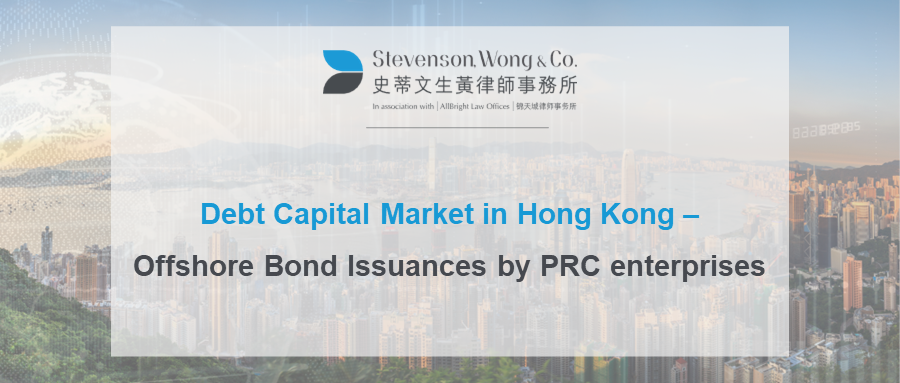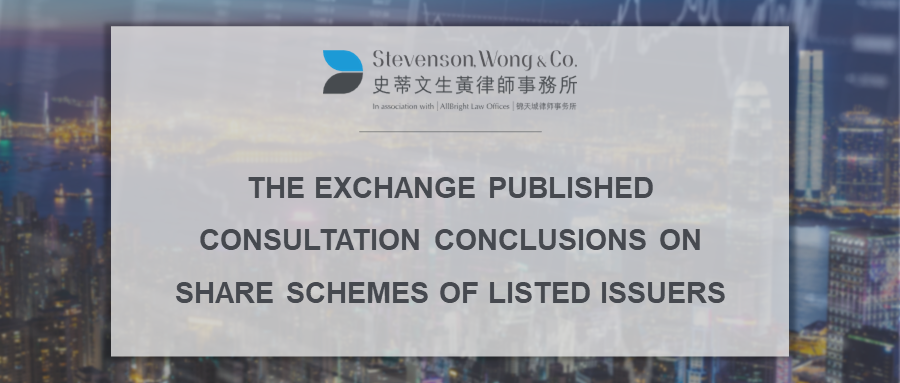1. Introduction
With increasing overseas operational activities coupled with more accommodating and flexible regulations regarding disclosure and registration procedures for issuing overseas bonds, there has been a rapid increase in offshore bond issuances from China in the past decade. These offshore bonds from PRC enterprises can be denominated in renminbi or other currencies (such as US dollars and euros), though US dollar bonds account for the largest portion. Furthermore, as shall further discussed below, they can be issued directly by Chinese domestic enterprises as well as their offshore subsidiaries or branches.

2. Hong Kong’s offshore bond market
Hong Kong’s debt capital market has experienced steady growth over the years. Mainland entities’ offshore offerings by Mainland authorities and private Mainland issuers have been one of the key drivers, with new issues amounting to almost RMB60 billion of bonds in the offshore renminbi market in 2021. In particular, Shenzhen Municipal Government was the first Mainland municipal government to issue RMB5 billion offshore multi-tranche bonds on The Stock Exchange of Hong Kong Limited (the “Exchange”) in 2021 1. In the past decade, China’s offshore bond issuance has grown exponentially with China responsible for almost 38% (or USD711 billion) of the Asia-Pacific international USD corporate bond market oustandings in 2020. The issuance showcases that Hong Kong keeps on striving to be a leading bond hub in Asia.
3. PRC regulations on offshore bond offering
We summarise the major PRC regulations governing offshore bond offerings as follows:
3.1. National Development and Reform Commission (“NDRC”) Regulations
Pursuant to “Notice of the National Development and Reform Commission on Promoting the Administrative Reform of the Recordation and Registration System for Enterprises’ Issuance of Foreign Debts” (《国家发展改革委关于推进企业发行外债备案登记制管理改革的通知》) issued in September 2015 by the NDRC, PRC enterprises and/or its respective offshore subsidiaries are required to register with the NDRC and obtain the registration certificate prior to the offshore bond offering, setting out the currency, volume, interest rate and planned usage of proceeds, among other details. Also, there are subsequent reporting requirements for filing information on the bond issuance with the NDRC within 10 working days after each offering, where issuers must demonstrate a good credit record, sound corporate governance and risk control systems, along with sufficient debt repayment ability without defaulting on existing obligations.
3.2. Regulations of the State Administration of Foreign Exchange (“SAFE”)
SAFE rules were amended in 2014 to allow for greater flexibility in encouraging PRC entities to seek offerings offshore. Prior restrictions on onshore entities guaranteeing offshore bond offerings were lifted and prior approval from SAFE was no longer required. Instead, the PRC parent company is only subject to the registration requirement that they shall file and register the offshore financing agreements and/or the guaranteed agreement with the local SAFE branch within 15 days from the execution of such agreements, pursuant to “the Measures for Foreign Debts Registration and Administration” (《外债登记管理办法》).
In addition, pursuant to Article 10 of the “Notice of the People’s Bank of China on Matters concerning the Macro-Prudential Management of Full-Covered Cross-Border Financing” (《中国人民银行关于全口径跨境融资宏观审慎管理有关事宜的通知》), the PRC company shall report the information on the execution of cross-border financing agreements to SAFE for filing after the date of execution of such agreements but no later than three working days before the withdrawal date.

4. Typical transaction structure of an offshore bond issuance
The following are the four typical transaction structures typically utilised by PRC entities for issuing offshore bonds:
4.1. Direct issuance by onshore companies
Onshore PRC entities, such as state enterprises or large financial institutions, may choose to issue the bonds offshore directly. A trustee is usually appointed to hold the bonds on behalf of the investors to exercise their rights. This method contains the simplest form without seeking a cross-border guarantee.
4.2. Guarantee by onshore parent companies
Some Mainland incorporated companies choose to issue offshore bonds through its overseas subsidiaries or a special purpose vehicle (“SPV”). The onshore parent company would provide a guarantee for the performance of the bond by the offshore entity. Credit ratings of the offshore bond would usually be tied to the parent company’s rating.
4.3. Standby letter of credit issued by banks
PRC entity could also offer bonds backed by a standby letter of credit (the “SBLC”) issued by a commercial bank (the “LC bank”) to serve as a cross-border guarantee in favour of the trustee acting on behalf of the bondholders. If the issuer cannot repay the bonds, the repayment obligation is on the LC bank, who is jointly and severally liable for the principals and interests. The bond’s credit rating would link to the LC bank’s credit which generally boasts better ratings than the issuer.
Although this method is more complicated than a direct issuance, or an onshore entity’s guarantee, the SBLC allows Chinese issuers to strengthen investors’ recognition without employing additional international credit rating agencies, which allows a significant lowering of the cost and interest rate of the bond.
4.4. Keepwell deeds and equity purchase undertakings deeds
Keepwell deeds is another credit enhancement mechanism frequently employed by Chinese entities when offering offshore bonds. In a keepwell deed, the onshore parent company provides a written undertaking that the offshore subsidiary or SPV would remain solvent with sufficient credit reserves during the tenor of the bonds. Unlike serving as a regular guarantee for paying off the debt in default, it only permits creditors to demand the credit enhancement to supplement the issuer’s liquidity for bond repayment. Equity purchase undertakings (“EIPU”) may be supplemented such that, in the event of default risk, the parent company would purchase the equity interest or assets in their offshore subsidiary to cover the debt repayment.
However, in the landmark Peking University Founder Group (“PUFG”) case, the legality and enforceability of the keepwell agreements were challenged. We note that the PRC administrators in that case refused to recognise the keepwell deeds in Mainland insolvency proceedings. However, the Hong Kong Courts allowed judgment against PUFG on a declaratory basis. It is yet to be decided how the Mainland and Hong Kong Courts shall cooperate with regards to such jurisdictional challenges. For more details, please see our litigation law update on this topic here.

5. Listing of Offshore Bonds on the Exchange
There are two main types of debt offering which can be listed on the Exchange: (i) debt securities which can only be offered to professional investors under Chapter 37 of the Rules Governing the Listing of Securities on Main Board of The Stock Exchange of Hong Kong Limited (the “Listing Rules/LR”); and (ii) debt securities which can be offered to public investors in a retail offering under Chapter 22 to Chapter 36 of the Listing Rules.
In Hong Kong, Chapter 37 is typically utilised in recent years for PRC issuers, given its shorter timeframe for obtaining listing approval and the simplified disclosure requirements. Some of the key requirements under Chapter 37 and the relevant guidance letter published by the Exchange are as follows:
- The issuer must have minimum net assets of HK$1 billion (LR 37.05) and must have produced audited accounts for the 2 years before the listing application made up to a date at most 15 months before the intended date of the listing document (LR 37.06). If an issuer is (a) a Supranational or a State corporation (as defined under the Listing Rules); or (b) a company listed on the Exchange; it shall be exempted from the above requirements;
- The debt securities must be freely transferable with a denomination of at least HK$500,000 (or equivalent in other currencies) (LR 37.09), be duly authorised (LR 37.10), and comply with the law of the place where the issuer is incorporated and the memorandum and articles of association of the issuer (LR 37.11);
- A minimum issue size of HK$100 million (or equivalent in other currencies). However, the minimum issue size requirement does not apply to: (a) tap issuances; and (b) unlisted issuances under a listed Medium Term Note programme (LR 37.09A); and
- Issuer is expected to disclose: (a) the terms and conditions of the debt securities; (b) financial information of the issuer; (c) risk factors, relating to the issuer, its business and the debt securities; (d) a description of the use of proceeds from the issuance of the debt securities; (e) business disclosure on the issuer; (f) a summary of the key taxation consequences associated with dealings in the debt securities; (g) restrictions on the subscription and sale of the debt securities (if any); and (h) other material information.
Please contact our Partner Mr. Rodney Teoh for any enquiries or further information.
This news update is for information purposes only. Its content does not constitute legal advice and should not be treated as such. Stevenson, Wong & Co. will not be liable to you in respect of any special, indirect or consequential loss or damage arising from or in connection with any decision made, action or inaction taken in reliance on the information set out herein.
1 “The Hong Kong Bond market in 2021”, March 2022, Hong Kong Monetary Authority, https://www.hkma.gov.hk/media/eng/publication-and-research/quarterly-bulletin/qb202203/fa1.pdf









